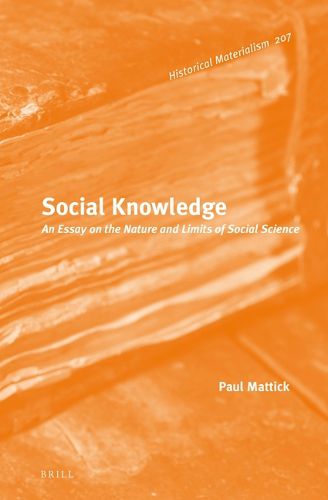Readings Newsletter
Become a Readings Member to make your shopping experience even easier.
Sign in or sign up for free!
You’re not far away from qualifying for FREE standard shipping within Australia
You’ve qualified for FREE standard shipping within Australia
The cart is loading…






How is scientific knowledge of social life possible? If there are social sciences, must they employ methods different from those of the natural sciences? In Social Knowledge, Paul Mattick argues that the well-known difficulties of the social sciences - in particular the predictive and explanatory failures of economics - are due not to an inherent resistance of social life to scientific explanation, but to the failure of social scientists to include their own categories of social explanation among the objects of scientific study.
Looking at Marx as an anthropological theorist, Mattick compares his critique of political economy with Evans-Pritchard’s analysis of Azande witchcraft. Just as the British anthropologist attempted to explain Azande ideas and rituals in terms of their place in native life, Marx wished to explain the continued faith in economics - despite its striking weakness as a science - in terms of the central role played by this system of ideas in the daily lives of natives of capitalist society. This comparison leads to the questions about the nature of scientific thinking and its relation to our everyday knowledge of social reality that are the subject of this book.
Second edition, with a new Preface by the author. The first edition was published in 1986 by Hutchinson, ISBN 9780091654603.
$9.00 standard shipping within Australia
FREE standard shipping within Australia for orders over $100.00
Express & International shipping calculated at checkout
How is scientific knowledge of social life possible? If there are social sciences, must they employ methods different from those of the natural sciences? In Social Knowledge, Paul Mattick argues that the well-known difficulties of the social sciences - in particular the predictive and explanatory failures of economics - are due not to an inherent resistance of social life to scientific explanation, but to the failure of social scientists to include their own categories of social explanation among the objects of scientific study.
Looking at Marx as an anthropological theorist, Mattick compares his critique of political economy with Evans-Pritchard’s analysis of Azande witchcraft. Just as the British anthropologist attempted to explain Azande ideas and rituals in terms of their place in native life, Marx wished to explain the continued faith in economics - despite its striking weakness as a science - in terms of the central role played by this system of ideas in the daily lives of natives of capitalist society. This comparison leads to the questions about the nature of scientific thinking and its relation to our everyday knowledge of social reality that are the subject of this book.
Second edition, with a new Preface by the author. The first edition was published in 1986 by Hutchinson, ISBN 9780091654603.